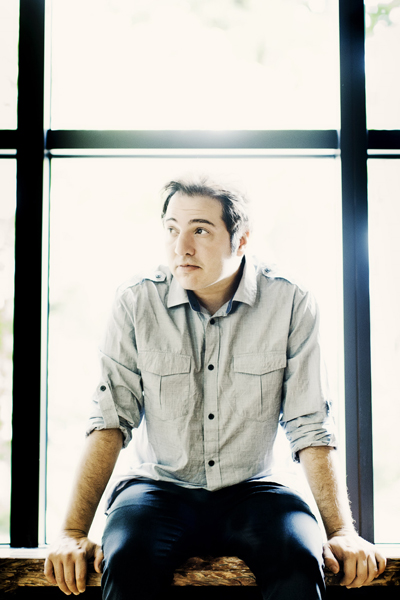Fazil Say

With his extraordinary pianistic ability, Fazil Say has been touching audiences and critics alike for 25 years in a way that has become rare. Concerts with this artist are different concerts; they are more direct, more open, more exciting. In short: they go straight to the heart. This is what the composer Aribert Reimann must have meant when, during a visit to Ankara in 1986, he had the pleasure, more or less by chance, of hearing the then 16-year-old. He immediately asked his companion, the American pianist David Levine, to come to the conservatoire in the Turkish capital, and he did so with the words that have since become commonplace: You have to listen to him, the boy plays like a devil.
Fazıl Say received his first piano lessons from Mithat Fenmen, a pianist who had studied with Alfred Cortot in Paris. Fenmen – perhaps sensing how great the boy’s talent was – asked his pupil to first improvise every day on everyday themes before engaging in the necessary piano exercises and studies. It was in this engagement with free creative processes and forms that the origin was laid for the enormous improvisational talent and aesthetic outlook that forms the core of pianist and composer Fazıl Say’s self-image. As a composer, Fazıl Say has been
commissioned by Salzburger Festspiele, WDR, Münchner Philharmoniker, Schleswig-Holstein Musik Festival, Festspiele Mecklenburg-Vorpommern, Wiener Konzerthaus, Dresdner Philharmonie, Fondation Louis Vuitton, Orpheus Chamber Orchestra, Boston Symphony Orchestra and the BBC, among others. His Oeuvre includes five symphonies, two oratorios, various solo concertos and numerous piano and chamber music works.
Fazıl Say received his fine-tuning as a classical pianist from 1987 onwards with David Levine, first at the Musikhochschule Robert Schumann in Düsseldorf, and later in Berlin. In addition, he regularly attended master classes with Menahem Pressler. Moreover, his outstanding technique soon enabled him to master the so-called war horses of world literature with astonishing aplomb, and it was precisely this mixture of subtlety in Haydn, Bach and Mozart, and virtuoso brilliance in the works of Liszt, Mussorgsky or Beethoven that finally led to his victory at the International Young Concert Artists Competition in New York in 1994. Fazil Say has subsequently performed with all the renowned American and European orchestras and numerous great conductors, developing a diverse repertoire ranging from compositions by Johann Sebastian Bach to the classics Haydn, Mozart and Beethoven, as well as Romantic and contemporary music, including his own compositions for piano.
Since then, Fazil Say has given guest performances in countless countries on all five continents; the French newspaper Le Figaro described him as a genius. In the process, Fazil Say has also appeared numerous times as a chamber musician. With violinist Patricia Kopatchinskaja, for example, he has performed in a fantastic duo for years; other prominent partners have included Maxim Vengerov, the Minetti Quartett, the Modigliani Quartett, Nicolas Altstaedt and Marianne Crebassa.
Numerous concert halls, orchestras and festivals have invited Fazil Say as artist in residence or introduced him to their audiences with portraits and focus weeks over the past decades. These include, among others, Konzerthaus Dortmund, Konzerthaus Berlin, Alte Oper Frankfurt, Wiener Konzerthaus, hr-Sinfonieorchester, Zürcher Kammerorchester, Dresdner Philharmonie, Camerata Salzburg, Schleswig-Holstein Musik Festival, Rheingau Musik Festival, Bodenseefestival and Festival der Nationen. Further portraits were heard in Paris, Tokyo, Merano, Hamburg and Say’s hometown Istanbul. In the 2022/23 season, he will be a Focus Artist with the Tonhalle-Orchester Zürich and Artist/Composer in Residence with the Staatskapelle Weimar.
In 2013, Fazil Say received the Rheingau Music Prize, and in December 2016, the International Beethoven Prize for Human Rights, Peace, Freedom, Poverty Alleviation and Inclusion in Bonn. In autumn 2017, he was awarded the Music Prize of the City of Duisburg.
Fazıl Say’s recordings of works by Bach, Mozart, Gershwin and Stravinsky on Teldec Classics as well as Mussorgsky, Beethoven and his own works on naïve have been highly praised by record critics and have received several awards, including three ECHO KLASSIK awards. In 2014, his recording of works by Beethoven – the Piano Concerto No. 3 with the hr-Sinfonieorchester Frankfurt under Gianandrea Noseda, the Sonata op. 111 and the Moonlight Sonata – as well as the album Say plays Say with exclusively his own works were released. In autumn 2016, Warner Classics released the recording of all Mozart sonatas, for which Fazil Say received his fourth ECHO KLASSIK in 2017. Together with Nicolas Altstaedt, he recorded the album Four Cities (2017). In autumn 2017, Warner Classics released Frédéric Chopin’s Nocturnes and the album Secrets with French songs, which he recorded together with Marianne Crebassa and won the Gramophone Classical Music Award in 2018. His 2018 album is dedicated to Debussy and Satie, while his latest release Troy Sonata – Fazıl Say Plays Say features his own works. In January 2020, Fazil Say’s recording of all Beethoven piano sonatas was released by Warner Classics, who will also publish his recording of Bach’s Goldberg Variations.







